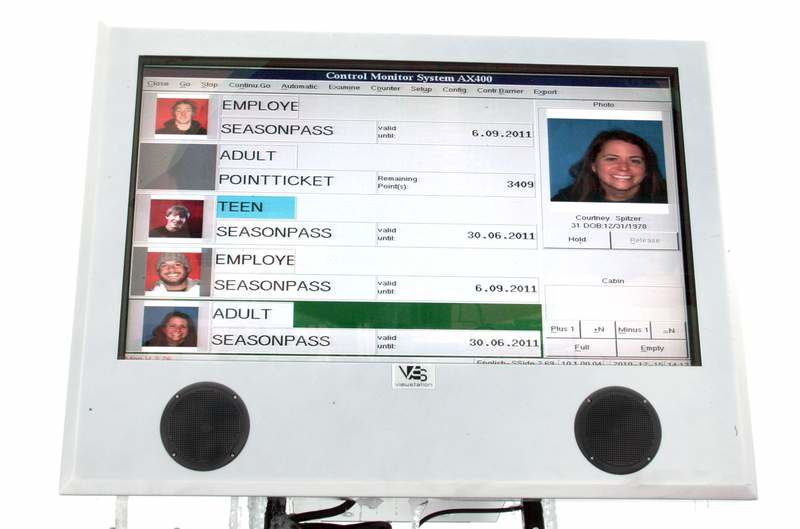Seeing fraud on screen at Bachelor
Published 4:00 am Thursday, December 16, 2010

- Snowboarders’ and skiers’ season pass pictures are displayed above the turnstiles at the bottom of the Pine Marten chairlift at Mt. Bachelor on Wednesday. The approximately 30-inch screen helps employees spot obvious mismatches.
To further cut down on fraudulent skiing and snowboarding, Mt. Bachelor has installed a television screen showing pictures of pass holders as they attempt to board the Pine Marten Express chairlift.
Bachelor appears to be one of the first few ski areas in the United States to adopt the technology.
The screen, insulated in a case, also tells lift-access employees at Pine Marten — currently the only lift that has a screen — if the skier or snowboarder appearing before one of the five operational turnstiles at the lift has a season pass or a day pass.
“It’s been a great deterrent, because people know their (pass) picture’s coming up here,” said Christian Sansing, the staffer checking Pine Marten’s riders early Tuesday afternoon.
The screen technology was not familiar to Troy Hawks, spokesman for the National Ski Areas Association in Colorado. “I can’t say I know of other (resorts) using a screen,” he said.
The technology
Radio-frequency identification (RFID) scanners embedded in panels to the left of the turnstiles — which were first used in the 2005-06 season — scan the rider’s pass to see if it is valid.
If so, an LED will give off a green light for Sansing or one of his colleagues to spot. The device also will sound a beep for Sansing to hear, in case he’s looking elsewhere. But the light and sound from the scanners only alert Sansing to a ticket’s validity. They cannot tell him if one skier is using another’s pass, for example. But the screen with pictures can tell him as much, and he can check to see if the pass holder’s picture matches up with his view of the person coming through the turnstile.
The approximately 30-inch-wide screen mounted above the gate with turnstiles helps Sansing notice obvious mismatches, such as a young girl’s picture showing up when a grown man wants to ride the lift. The screen has five sections stacked vertically and shows pictures and pass information as skiers and snowboarders get scanned.
Last season, Mt. Bachelor started using hand-held scanners that show pictures, to spot rider fraud. This summer, said mountain spokesman Andy Goggins, Mt. Bachelor incorporated the screen into the Pine Marten lift system in place of the hand-held scanners.
“It’s more efficient, getting on the lifts,” Goggins said. “It’s … better (from a) guest-service standpoint, and it also … prohibits the potential for people to scam (Mt. Bachelor), so overall to enhance the guest experience. Anything we do up on the mountain is with the guest in mind, so that was the main focus with that, as well as to deter scamming. But at the same time, it was to make a more efficient lift access.”
Feedback
Several skiers and snowboarders in the mountain’s West Village parking lot on Tuesday said they had no qualms with the television screen showing pictures of them.
“I don’t mind,” said Corey Beelke, 27, of Redmond. Beelke said he has a season pass and had not noticed the screen during a previous visit to the mountain.
Nick Secrest, 62, of Salem, also a season-pass holder, said the screen was a great idea.
“People that I’ve seen go through it seem to enjoy it,” he said. “I haven’t seen anybody that’s been negative about it at all. Especially adults with kids. They really enjoy it.”
As for season-pass holder Joe Cullen, 20, of Klamath Falls, he had no problem with the screen, either.
“I didn’t see my picture, so I wasn’t complaining,” he said. And he looked, he said.
Larry Williams, CEO of Axess North America, based in Park City, Utah, and tied to Axess AG of Salzburg, Austria, said Mt. Bachelor was one of the first ski areas in the United States to try using RFID scanners to prevent fraud, with hand-held scanners or a screen. Still, only about 20 ski areas in the United States use hand-held or screen scanners, Williams said. The technology is much more popular in Europe, he said.
Williams said ski areas can choose to show information such as gender and height with Axess’ equipment, although Bachelor only displays pass information and rider pictures at this point.
A company in East Setauket, N.Y., Mountain Pass Systems LLC, has applied for a patent for software that uses biometric scanning to prevent fraud, said CEO Hal Charych.
Charych said RFID technology is not perfect. “It all depends on the person that’s looking at the monitor and the people going through,” he said. Disguises such as facial hair and different clothing can fool a person checking the screen, while an automated biometric scanner can check for the outline of the rider’s body, Charych said.
The law
Deschutes County Sheriff’s Office Lt. Deron McMaster said no one from the office has been called up to the mountain on pass fraud cases so far this season. But, as it occurred at least a dozen times last season, according to Bulletin archives, McMaster expects it to happen sooner or later in the next few months.
“You know, people don’t really change that much,” he said.
Neither Goggins nor Sansing had heard about any pass violations as of Tuesday, they said.






